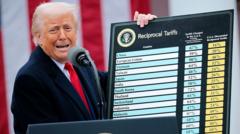The uncertainty in U.S.-China trade relations grows as Trump considers new tariffs on electronics, challenging previous exemptions.
Trump Signals Shift in U.S. Tariff Strategy for Electronics Amid Trade Tensions

Trump Signals Shift in U.S. Tariff Strategy for Electronics Amid Trade Tensions
Trump reignites tariff discussions just days after exemptions for phones, indicating potential shifts in trade policy.
Despite a recent announcement of exemptions for Chinese-made smartphones and electronics, President Donald Trump stated that these items will not escape tariffs entirely. In a social media update, Trump clarified that while some products might have been temporarily exempted, they would rather shift to what he terms a different "tariff bucket," effectively subjecting them to a new semiconductor tariff.
This remark came after a wave of optimism in European stock markets, which surged following the earlier announcement of tariff exemptions that had offered hope for economic relief. However, China's government has called on the U.S. to abandon its current tariff regime, advocating for a respectful negotiation approach.
U.S. officials confirmed that these new tariffs would be implemented in addition to existing global tariffs, pending updates from Trump about specific duties expected soon. Commerce Secretary Howard Lutnick emphasized the need for the U.S. to secure the production of essential goods like semiconductors domestically.
Notably, Trump's comments contradict the U.S. customs notice indicating that popular consumer electronics like smartphones and computers were to be excluded from new tariffs based on certain thresholds. The President dismissed reports of these exemptions as misleading, reiterating the intention to review the entire electronics supply chain under the ongoing National Security Tariff Investigations.
Meanwhile, companies like Sony have begun to feel the pressures of potential tariffs, announcing a price increase for its gaming console in various international markets while avoiding changes in the U.S. for now. The Chinese Ministry of Commerce criticized the U.S. for only taking "small steps" toward resolving trade tensions and signaled an intent to assess the repercussions of U.S. decisions.
In response to escalating tension, trade officials have indicated no immediate dialogue plans between Trump and Chinese President Xi Jinping. The two countries are locked in a tit-for-tat tariff war, which sees China retaliate with increased levies on American products.
Despite claiming tariffs serve as a negotiating tool to obtain fairer terms and restore American manufacturing jobs, Trump's tariff policies have led to increased market volatility and fear of a broader decline in global trade impacting economies and employment worldwide. The situation remains fluid, with many eyes awaiting the President's forthcoming announcements on the complicated tariff landscape.
This remark came after a wave of optimism in European stock markets, which surged following the earlier announcement of tariff exemptions that had offered hope for economic relief. However, China's government has called on the U.S. to abandon its current tariff regime, advocating for a respectful negotiation approach.
U.S. officials confirmed that these new tariffs would be implemented in addition to existing global tariffs, pending updates from Trump about specific duties expected soon. Commerce Secretary Howard Lutnick emphasized the need for the U.S. to secure the production of essential goods like semiconductors domestically.
Notably, Trump's comments contradict the U.S. customs notice indicating that popular consumer electronics like smartphones and computers were to be excluded from new tariffs based on certain thresholds. The President dismissed reports of these exemptions as misleading, reiterating the intention to review the entire electronics supply chain under the ongoing National Security Tariff Investigations.
Meanwhile, companies like Sony have begun to feel the pressures of potential tariffs, announcing a price increase for its gaming console in various international markets while avoiding changes in the U.S. for now. The Chinese Ministry of Commerce criticized the U.S. for only taking "small steps" toward resolving trade tensions and signaled an intent to assess the repercussions of U.S. decisions.
In response to escalating tension, trade officials have indicated no immediate dialogue plans between Trump and Chinese President Xi Jinping. The two countries are locked in a tit-for-tat tariff war, which sees China retaliate with increased levies on American products.
Despite claiming tariffs serve as a negotiating tool to obtain fairer terms and restore American manufacturing jobs, Trump's tariff policies have led to increased market volatility and fear of a broader decline in global trade impacting economies and employment worldwide. The situation remains fluid, with many eyes awaiting the President's forthcoming announcements on the complicated tariff landscape.






















